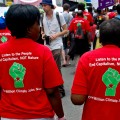Fast-start Finance at Crossroads
Cécile S | November 15, 2013.
Fast-start finance is a hot topic at the UN climate change negotiations in Warsaw with countries recently releasing their final figures.
During 2009-10, developed countries agreed to free up US$30 billion in new and additional financing for developing countries and their mitigation efforts. The goal is to raise US$100 billion each year, from public and private sources, by 2020.
By the end of the fast-start finance period of 2010-2012, the currently voluntary reporting of developed countries has resulted in the mobilisation of US$35 billion within two years.
Stefan Agne from the European Commission was keen to highlight how the EU fully delivered on its commitment of €7.2 billion, over 60 per cent of which was distributed as grants.
It is not clear how much of this cash is actually new and additional. For example, a significant share of the finance falls under official development assistance, promting Papua New Guinea to call for a clarification of what constitutes climate finance in the official negotiations.
Halldor Thorgeirsson, director of the UNFCCC implementation strategy, notes that the fast-start finance has been a very good trust-building exercise. It has also been an “opportunity to gather the lessons learnt from the projects and take them on a longer journey to mobilise long-term climate finance”.
Three main lessons:
1. The importance of country leadership and ownership from developing countries. To be successful, climate projects have to be made in partnership between both countries.
2. Effectiveness matters. Aslak Brun of Norway pointed out that “results on the ground is what matters. Outcomes have to be able to be measured, reported and verified”. Countries want to know where their money is going.
3. Fast-start finance doesn’t replace private investment. Trigg Taley, lead negotiator for the United States, insists that private capital is still essential.
New Zealand have synthesised these learnings together and developed a proposal for a ‘Warsaw Platform for Effective Climate Finance’. A final decision is yet to be made on this proposal.
Despite the valuable lessons learnt, are they needed if countries are yet to commit to more financing.
By Cécile Schneider, photo by Laura Owsianka.











comment